This post contains affiliate links.
Everyone who likes hot food has a stash of their favorite ground hot pepper powder. Whether it is cayenne, chillies or serrano it is used to add a little heat to anything and everything. Well here is another one to try. You can use any type of pepper, lacto-ferment it, dehydrate them until they are crispy and then process them into a powder using a blender, or coffee grinder.
Equipment:
- Silicone pad
- Food dehydrator
- Blender or coffee grinder
- Spice jar
Ingredients:

- Fermented hot peppers of your choice
Instructions:
Spread the fermented peppers onto the silicone pad

Place the silicone pad on top of the dehydrator rack and put it into the dehydrator

Dehydrate at 150℉ (65℃) until they are very dry (24-48 hours)

Remove them from the dehydrator and powder them in the blender or coffee grinder

Spoon into the spice jar and keep it handy for your next spicy recipe

